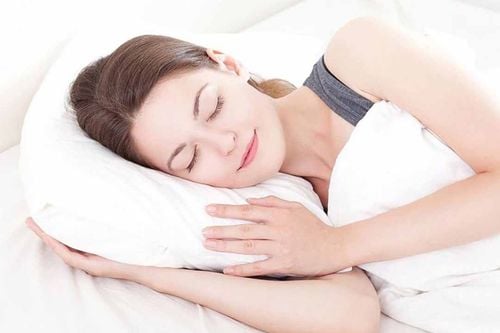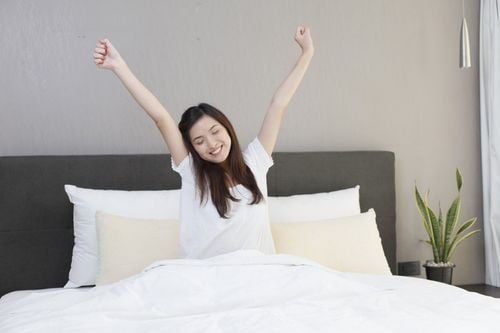This is an automatically translated article.
Some studies indicate that the lunar cycle can affect sleep, but so far the research is only suggestive, there are still many unknowns and contradictions. Overall, study participants slept slightly less on nights with a fuller or brighter moon than on a new, dim moon.
1. What is the lunar cycle?
The moon "transforms" every night, sometimes round and bright, sometimes with a faint crescent shape. The reason is that the Moon does not produce its own light, but is illuminated by the Sun. Depending on the position of the Sun, Moon and Earth in relation to each other, the amount of sunlight reflected varies. So from our Earth perspective we will see the Moon changing shape over time.
Starting with a complete circle (full moon), the Moon gets smaller each night until it's completely invisible (new moon). At that point, the Moon slowly fills up again until it's completely round. It takes 29.5 days for the Moon to complete this vacancy.
The cyclic variation of the Moon is divided into 8 phases, each of which represents the exact shape of the Moon and reflects the process of increasing or decreasing roundness. The 8 phases are:
New Moon; Crescent moon; The first half of the month; Moon; Full moon; Moon; The last half of the month; Crescent moon. Each cycle correlates with the distinct positions of the Moon, Earth, and Sun.
In addition, the Moon also appears in a different position in the sky each night as it orbits the Earth. This affects the rise and fall of the Moon, slowing its rise by about 50 minutes per day. The full moon occurs only when facing the Earth and the Sun, so it will rise in the evening and set in the morning. At the time of the new moon, the Moon aligns with the Sun, so the two will rise and set together.
2. Can the lunar cycle affect sleep?
The impact of the Moon on circadian rhythms is well documented in the natural world. Changes in tree diameter, crab reproduction patterns, and the nocturnal activity of certain animals can all be affected by the lunar cycle. However, research on the ability of the lunar cycles to affect humans is unclear, most of the studies are small and produce conflicting results.
However, there is evidence that lunar cycles can affect sleep, with the most obvious being the full moon phase.
A sleep analysis shows that a full moon can reduce sleep quality. When observing the sleep of volunteers during this period, experts found that it took them 5 minutes more to fall asleep, 20 minutes less sleep, longer time to reach REM sleep, decreased REM sleep, and decreased sleep time. 30% sleep deeply and self-report their sleep quality has decreased. Another study found that total sleep time during a full moon decreased by 25 minutes and the number of awakenings increased. However, participants in this study took longer to achieve REM sleep during the new moon, in contrast to previous research. The third analysis looked at data from 319 people. In it, they had lower sleep quality, slept less deeply, and were slower to achieve REM sleep during the full moon. In the larger study, the researchers analyzed sleep patterns in three indigenous Argentinian communities and 464 American college students living in a large city. Regardless of location and amount of artificial light exposure, all groups slept later and slept less time in the week before the full moon.

Có bằng chứng cho thấy các chu kỳ Mặt Trăng có thể ảnh hưởng đến giấc ngủ
3. Why does the Moon affect sleep?
3.1. The bright moonlight disrupts sleep
Many people theorize that the full moon disrupts sleep because of the amount of sunlight reflected back to Earth. Our body's internal circadian clock is calibrated by increasing and decreasing hormone levels in response to light perception. Therefore, light level is one of the most important factors affecting sleep quality and sleep.
However, the luminosity of moonlight is only 7% of the intensity of sunlight, which is a relatively low intensity. Humans are regularly exposed to artificial light at night more than the amount of light reflected by the Moon. Furthermore, studies of sleep disruption during a full moon are often conducted on cloudy nights or in closed, windowless environments.
3.2. Electromagnetism affects health
Another theory is that the Moon causes electromagnetic oscillations on Earth through a complex process. Now, research suggests that humans may be sensitive to low-level geomagnetic variations. Geomagnetic events (such as geomagnetic storms and auroras) are associated with a wide range of health effects, including headaches, changes in blood pressure, blood flow, and even heart attacks. Although the exact biological basis of these changes is unknown, the study points to several mechanisms involving the body's hormone levels, DNA breakage, and inflammation.
3.3. Gravity changes sleep
There is an opinion that the gravity of the Moon affects human health. Because the human body is mostly water, while the Moon's gravity has a significant effect on ocean tides. However, the Moon's gravity on humans is very small. The researchers estimate that the tidal effect on a person is smaller than a millionth the size of an atom.
The Moon's gravity is also roughly equal during the full moon and new moon. Therefore, any sleep variation that occurs during a lunar cycle is unlikely to be caused by a change in gravity.

Nghiên cứu so sánh tác động của tuần trăng đối với giấc ngủ ở nam giới và nữ giới là rất hiếm
4. The specific impact of the lunar cycle on sleep by sex
The Moon's impact on female fertility has long been debated. Many people believe that the phase of the moon controls the menstrual cycle and affects fertility. If so, it is also possible that the Moon affects sleep in women through female hormones. There's a lot of evidence that sleep problems can be caused by hormonal changes during menstruation, pregnancy, and menopause.
However, the relationship between the lunar cycle, female reproductive patterns and sleep is still conflicting. One 15-year study found that the menstrual cycles of participants were not continuously synchronized with the lunar phase, with menstruation possibly occurring just before a full moon or a new moon.
Another data analysis found that menstrual cycles and moon phases were not correlated. However, those whose periods started when the moon was near full reported having better sleep. In particular, women whose cycles start at the crescent moon often have poor sleep.
Studies comparing the effects of the moon phase on sleep in men and women are rare. For example, in one study, female volunteers had reduced sleep time and less REM sleep around the time of the full moon. However, male volunteers increased REM sleep during this lunar cycle.
A study done in 2016 - 2018 found that men are more sensitive to the Moon. They slept about 21 minutes less, slept less well, and spent an extra 14 minutes awake at night after falling asleep for the first time on nights when the moon had grown from young to full. Meanwhile, sleep in women was shortened by 12 minutes, remaining unaffected. In addition, moonlight is a reflection of sunlight and affects levels of melatonin - a hormone that signals nighttime and sleep time. Previous studies have found lower levels of melatonin and testosterone in men and higher levels of the stress hormone cortisol during a full moon.
5. Moon, sleep and mental health
The effect of the Moon on sleep is more pronounced in people with mental health disorders. Recent research has highlighted the relationship between moon phases and symptoms of bipolar disorder. In one study, a patient's mood cycle often synchronized with the lunar cycle over the course of 37 years. Subsequent small studies have also demonstrated a link between the lunar cycle and the bipolar mood cycle.
The impact of the lunar cycle on other mental health disorders - such as anxiety and depression, has not been confirmed. However, many studies evaluating the link between moon phases, anxiety, and depression have found no evidence of a relationship.
To be able to sleep well regardless of the influence of the Moon, you need to adjust the bedroom environment and practice certain habits. Simple things like keeping the bedroom dark, limiting caffeine, avoiding blue light and staying awake at the right time can help you improve the quality of your sleep.
Please dial HOTLINE for more information or register for an appointment HERE. Download MyVinmec app to make appointments faster and to manage your bookings easily.
References: sleepfoundation.org, webmd.com













